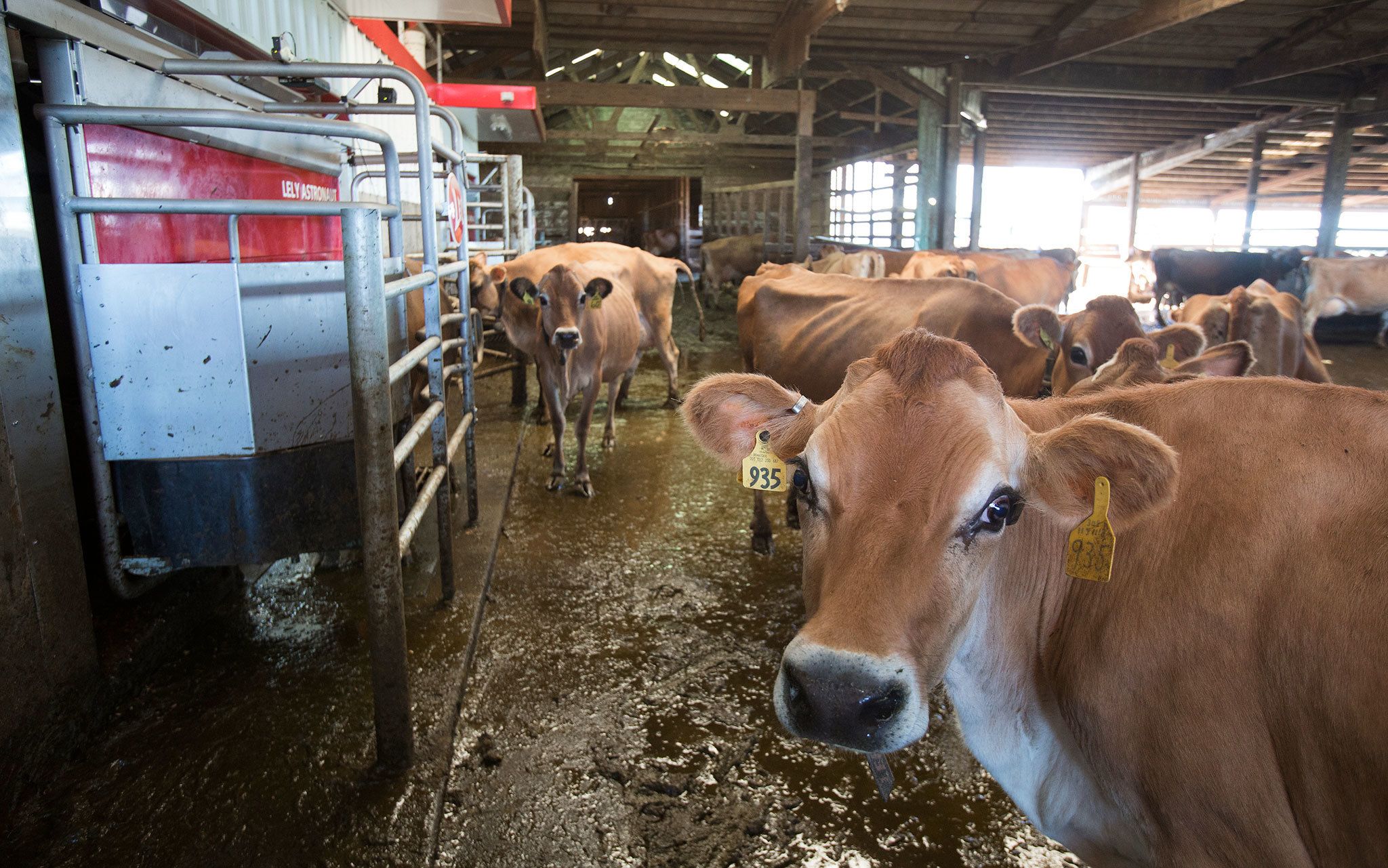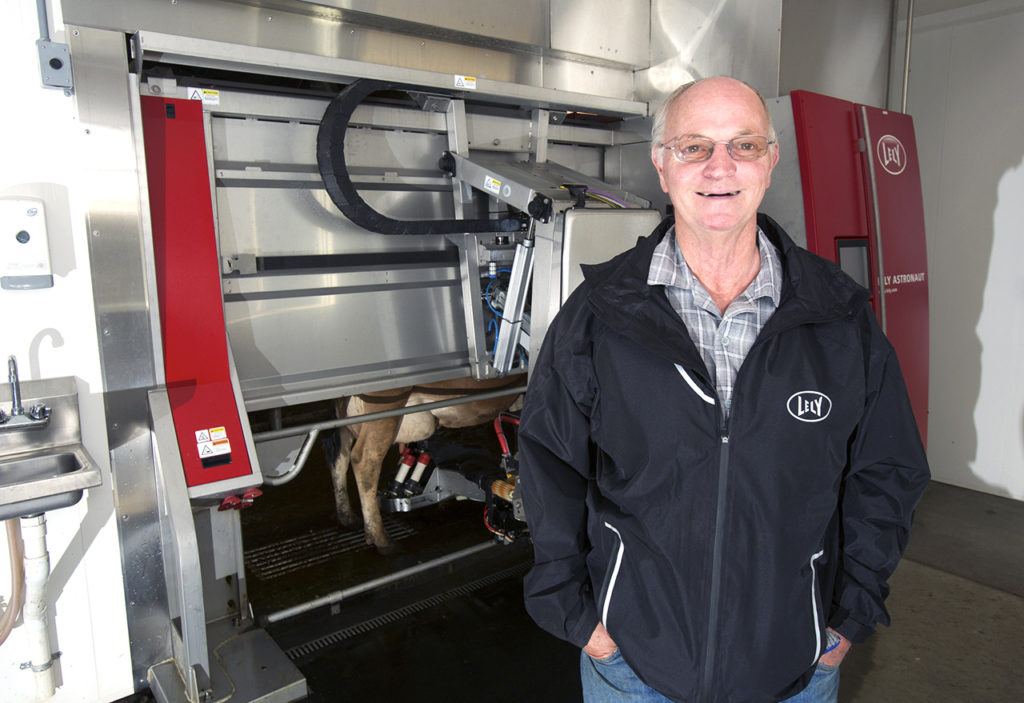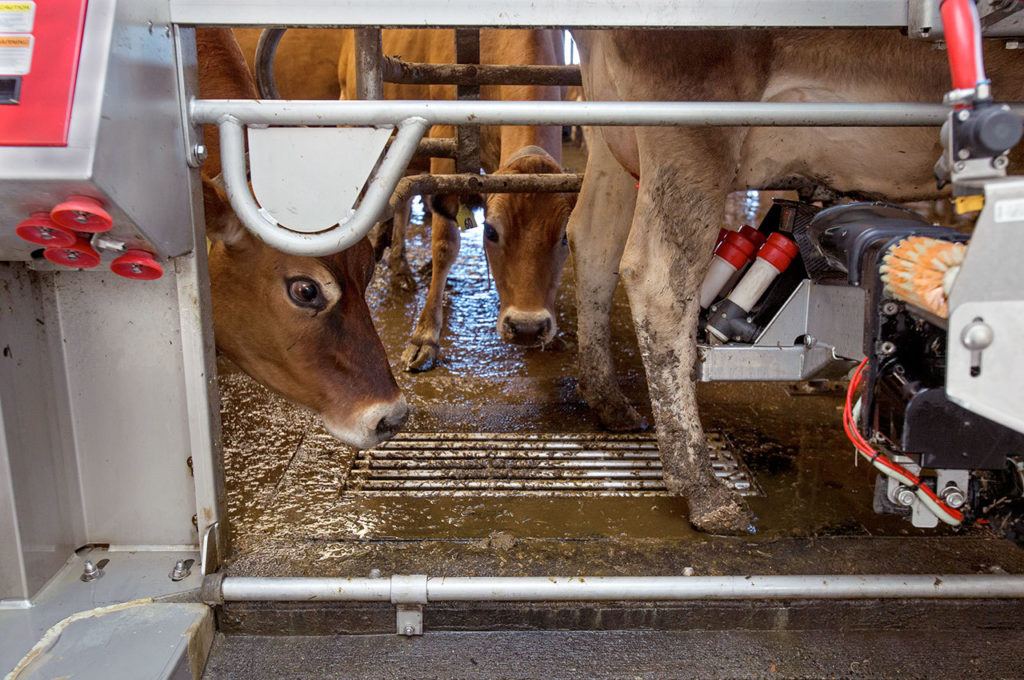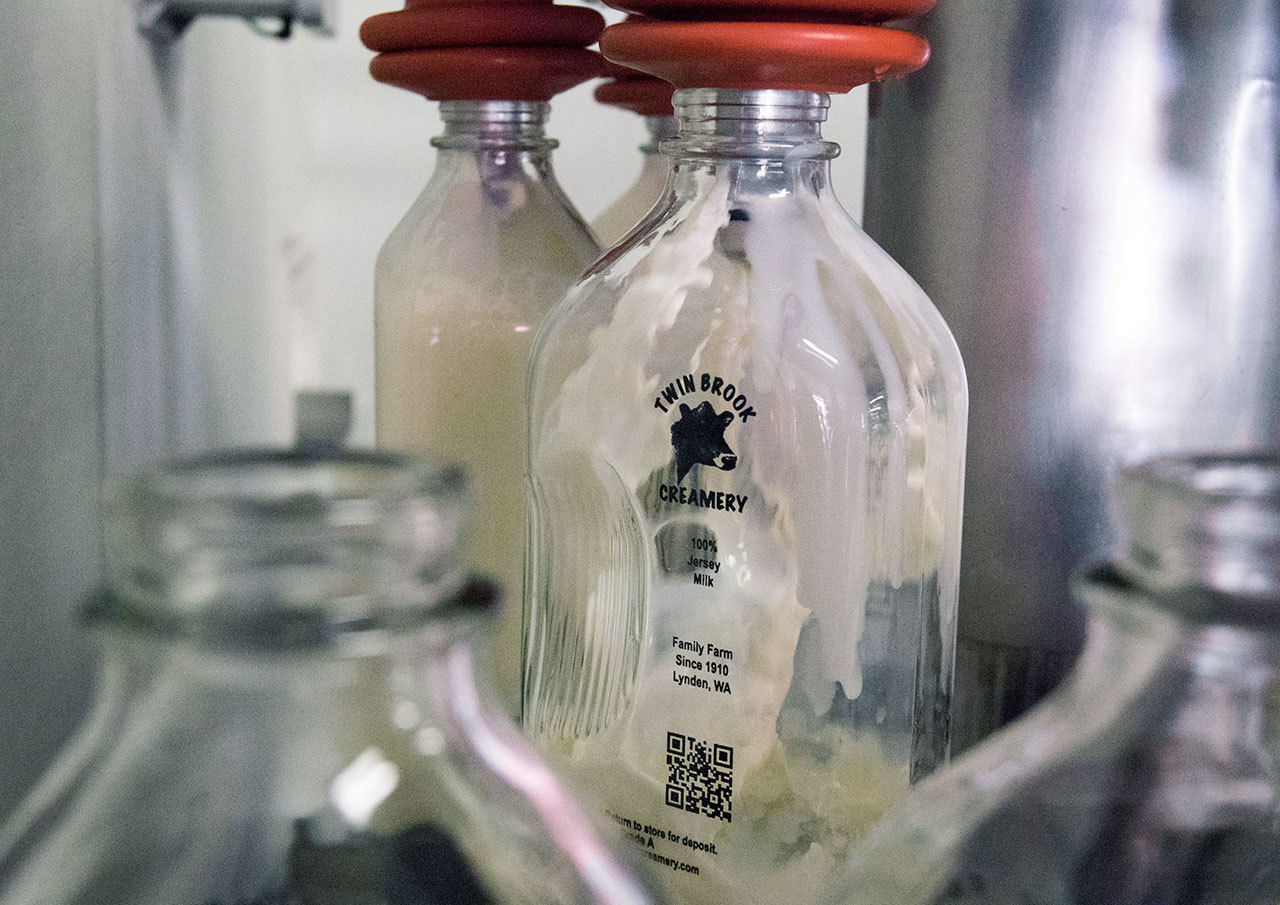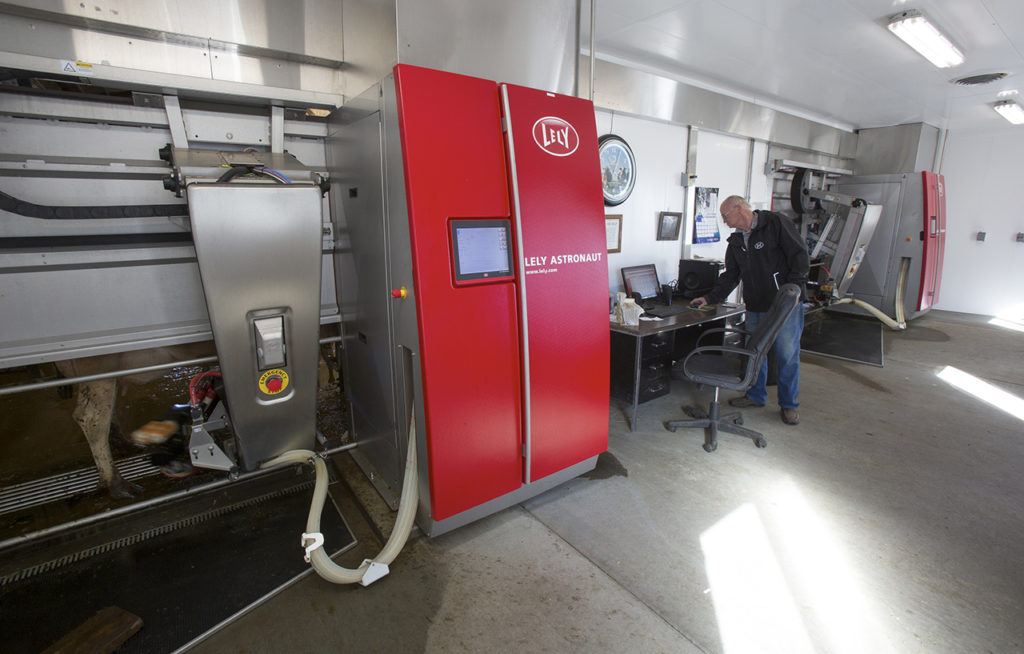It’s not difficult to see the Dutch heritage alive in Lynden. The bakeries and windmills pay homage to the Dutch immigrants who settled in Whatcom County at the beginning of the 20th century. Outside of downtown, that heritage is alive and well in the form of family dairy farms.
Dairy is a big part of the county’s history, but as farmers face pressure from increased land costs, lower profits and increased regulation, the role dairy will play in its future is unclear.
Washington is a major dairy producer — it was the 10th biggest producer of milk in the country, as of 2012, and a Washington State University study found that in 2011, dairy was a $1.3-billion industry in the state.
A USDA report released at the beginning of this year shows that Whatcom County has 98 dairy producers — that’s more than any county in the region, which includes all of Washington, western Oregon and northern Idaho.
The farms in Whatcom County tend to be smaller, however. The 64 dairy producers in Yakima County produce almost three times more milk.
All Susan Kerr, a regional livestock and dairy specialist at the Washington State University Extension, says that Whatcom County’s dairy industry today can be traced back to the Dutch families who started coming here around 1900.
“It was a family business in their home country where they came from,” she said.
Many of the farms today are family farms.
One of those is Twin Brook Creamery, which was started in 1910 by Larry Stap’s great-grandfather.
“That’s how a lot of the dairies in the county are, they’re multi-generational,” Stap said.
Twin Brook is a little different in one way – it bottles milk in reusable glass bottles and sells it directly on store shelves. Only a few other local dairies, including Edaleen Dairy and Fresh Breeze Organic, do this.
Most dairies in the county are members of the Darigold co-op (or the Organic Valley co-op for organic farms). The members add their milk to the co-op, where it’s mixed together and sold under the Darigold brand. Darigold handles the processing and distribution.
“I have to do my own balancing. I have to do my own marketing. I have to do my own quality control,” Stap said. “Things that many dairies take for granted when they shop their milk off to a processor.”
Stap started bottling milk in 2007. His daughter and her husband wanted to join the dairy and carry on the family farming tradition. Most dairies have to get bigger when this happens, adding more cows to make more profit for the new partners.
Stap wanted to try something else. Instead of making more milk, he wanted to try making his milk worth more.
“What we (found out) through very informal research — just driving around, talking to people — nobody was doing it in glass,” he said.
Stap decided to turn his milk into a niche product: conventional Jersey cow milk sold in glass bottles. It was a gamble. Especially in 2009, when the price of milk crashed. At that point, Stap was still selling some of his milk to the co-op.
“I was losing money conventionally and I was losing money bottling milk because I didn’t have enough volume yet,” Stap said. “We sucked up a lot of equity for a couple years there. But we eventually turned it around.”
Now that Stap is no longer a part of the co-op, he can set his own prices and is sheltered from the roller coaster of monthly milk prices, which can be a good thing or a bad thing.
The price of milk
The price farmers get paid for their milk is set every month by the USDA.
This evens out the discrepancies that could occur based on geography. Whatcom County dairy farmers are far from the major market in Seattle, meaning most of their milk is turned into less perishable products like milk powder. Powder fetches a lower price than plain liquid milk. That means if the USDA didn’t intervene, dairy farmers in this county would make less money than the farmers closer to Seattle.
Instead, every month, the government takes the average price of all dairy products to determine the farmers’ cut.
That also means that the pay farmers get has little to do with how much it costs them to produce milk.
“The dairy industry has no way to pass on their costs,” Stap said.
Over the past few years, the cost of production has steadily risen, while the price of milk goes up and down.
While Stap is shielded from the price roller coaster, other dairies are not.
Larry DeHaan owns Storm Haaven Farm. He’s a member of the Darigold co-op. Milk prices took a nosedive at the end of 2014, and have been floundering ever since.
“It’s a very cyclical type market,” he said. “We are thinking positively, we are on the upswing currently.”
Over the past three months, prices have slowly been creeping up, but just pennies at a time. According to data compiled by the USDA’s Economic Research Service, last year it cost more to produce milk in Washington than farmers were paid for it.
“We’re friends with our banker,” DeHaan said. “And our banker is well aware of the nature of the dairy business.”
The squeeze is especially tight in the county, and Western Washington in general. Here, land is at a premium. Even the land that’s not being eyed for development is getting scooped up for berry farms.
A changing industry
The dairy industry has evolved dramatically over the years.
Through selective breeding, cows have become more efficient.
Concern for the welfare of the cows is at an all time high.
“Cow comfort is a huge issue, industry-wise, but we’ve been at the forefront of that in Whatcom County,” DeHaan said.
That’s because in rainy Western Washington, cows spend so much time indoors their barns must be as comfortable as possible.
“If they’re not comfortable, they don’t give milk,” DeHaan said. “Actually, I think my cows live more comfortably than I do.”
Part of that is due to farmers now paying closer attention to needs of each cow. New technology has made that easier than ever, especially new robotic milking machines.
Traditional milking in a milk parlor, like what DeHaan uses, involves workers herding the cows into a big room in groups at a time, several times a day, and manually hooking them up to the milking machines.
It’s a labor intensive process, and it doesn’t allow each cow to get specialized attention.
One year ago, Stap invested in three robotic milkers for his cows.
The robots are present in the barn all the time. When a cow wants to get milked, or when it wants some of the grain in front of the machine, all it has to do is go up to the machine. A sensor reads the electronic tag the cow wears around its neck, and pulls up information on when it was last milked and how much milk it gave. If it’s eligible to be milked again, a laser guided milking machine automatically attaches to the cow’s udders.
For the cows, it’s a much more comfortable, less-stressful process.
Stap says the investment in the robotic machines has been more than worth the $200,000-apiece price tag. Since he got them, he’s been getting 20 percent more milk, he said.
The electronic tags the cows wear also act as a health monitor. If a cow doesn’t give as much milk as usual, if it doesn’t walk around as much, even if there’s a change in the amount of time it spends chewing its cud, the computer knows and the farmers know to give the cow a check up to see if it’s having health problems.
It’s expensive running a dairy farm on this side of the state. Many farmers either sold out, or moved to Eastern Washington, Idaho and New Mexico,” Dehaan said.
“The dairy industry has kind of been in the tubes for a year, year and a half,” he said. His optimism about the future varies day-to-day, he said.
He stops lamenting during milking time, though, as he watches his cows head in to the barn from the rolling green fields.
“I think there is a good future for the dairy business in Whatcom County, and it may look different than it does now,” he said, but the bottom line is, “if people love cows, like most dairymen do, we will find a way to keep it an integral part of this community.”
Talk to us
> Give us your news tips.
> Send us a letter to the editor.
> More Herald contact information.
